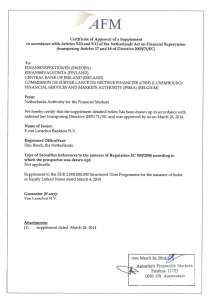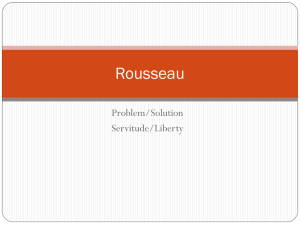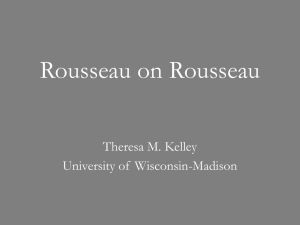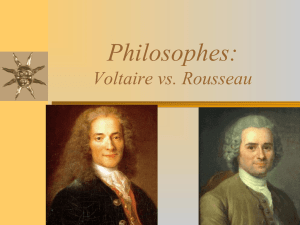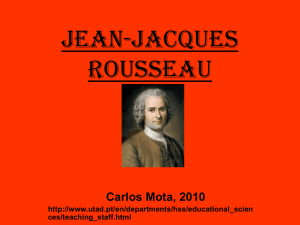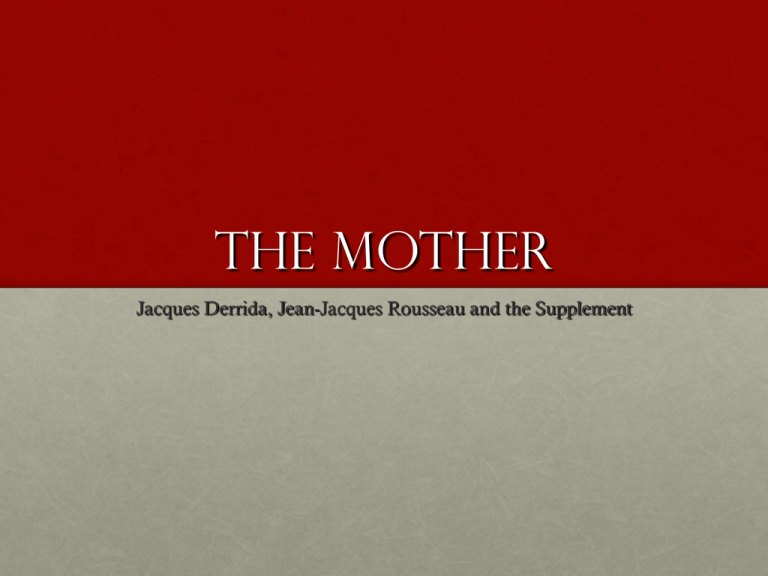
The mother
Jacques Derrida, Jean-Jacques Rousseau and the Supplement
The mother as
supplement
• For Rousseau the mother is a supplement to mother nature.
• However, Rousseau considers supplementation to be bad in
relation to nature, which is inherently good.
• What might this mean for how we can think about nature
and nurture, particularly in terms of childcare and
education?
• Derrida critiques Rousseau’s dislike of supplementation by
suggesting that, despite Rousseau’s reasoning, human
experience is inseparable from a logic of supplementation.
This also leads Derrida to imply that any form of ‘natural’
reasoning is therefore paradoxical: it is itself supplementary
and supplementing.
Nature against writing or presence
against absence
• ‘Rousseau condemns writing as destruction of presence and
as disease of speech.’ (142)
• Rousseau is interested in preserving a ‘natural’ absolute
presence and because to him writing (unlike speech) is seen
as unnecessarily supplementary to experience it is bad.
• Derrida argues that the reasons for Rousseau’s dismissal of
writing are actually implicit in the conditions of human
experience.
• Derrida argues that Rousseau indicates he is sacrificing his
own self-presence to be able to communicate his ‘worth.’ He
thus becomes self-present to his own sacrifice and thereby
his worth.
differance
• Derrida introduced a concept called ‘differance’ to
philosophy. It is used to remind us that there is more to life
than what is present and that it takes more than what is
present to make life.
• With this concept of differance, Derrida picks up on a
paradox in Rousseau’s thought and the philosophy of
presence in general. To desire absolute presence (or unsupplemented nature), like Rousseau does, is precisely to
desire an ideal which is not present within presence:
‘Without the possibility of differance, the desire of presence
as such would not find its breathing-space. That means by
the same token that this desire carries in itself the destiny of
its non-satisfaction. Differance produces what it forbids,
makes possible the very thing it makes impossible. (143)
Introducing the
supplement
• Derrida says that he wants to think ‘Rousseau’s experience and
his theory of writing together.’ (144) This is because Derrida want
to use Rousseau’s theory of writing as a framework within which
to reconsider his experience:
‘On the side of experience, a recourse to literature as reappropriation
of presence, that is to say, as we shall see, of Nature; on the side of
theory, an indictment against the negativity of the letter, in which
must be read the degeneracy of culture and the disruption of
community.
If indeed one wishes to surround it with the entire constellation of
concepts that shares its system, the word supplement seems to
account for the strange unity of these two gestures.’ (144)
Read from here until ‘…lack nothing at all in itself.’ (145)
Childhood and
pedagogy
• A supplement can be thought of as being in addition to or in place
of. However, in general Rousseau sees any supplement as being in
place of the goodness of nature.
• For Rousseau nature is good and ought not to be supplemented.
But as nature cannot supplement itself we sometimes need to so
as to be able to preserve its goodness.
• But for Rousseau, all education is supplementation; it must
therefore be as close to nature as possible. Derrida raises some
problems for this:
‘Childhood is the first manifestation of the deficiency which, in
Nature, calls for substitution. Pedagogy illuminates perhaps
more crudely the paradoxes of the supplement. How is a
natural weakness possible? How can Nature ask for forces that
it does not furnish? How is a child possible in general?’ (146)
Nature and reason
•
Nature and Reason are both supplemented, which is unthinkable in terms of Reason.
•
This puts into question any conception of natural law or human nature. This is because
if it necessary to supplement Nature and Reason then they cannot account for
everything.
•
This is why the supplement is ‘dangerous’ – it is dangerous for the ideal concepts of
Reason and Nature.
•
‘Reason is incapable of thinking this double infringement upon Nature: that there is a
lack in Nature and that because of that very fact something is added to it.’ (149)
•
This kind of paradox is valid but beyond reason: that Nature is ‘naturally’ supplemented.
•
‘The supplement is therefore equally dangerous for Reason, the natural health of
Reason.’ (149)
•
However, Reason itself is also what figures out a logic of supplementary. It exists
precisely because of a ‘lack’ in Nature.
The natural and the
supplement
• One of the underlying themes that Derrida locates in
Rousseau’s texts is that of a difference between sex and
masturbation.
• Sex is understood by Rousseau as natural but
masturbation is a dangerous and unnatural
supplement.
Mother?
• For Rousseau, ‘The supplement that “cheats” maternal
“nature” operates as writing, and as writing it is
dangerous to life.’ (151)
• Here again we see the connection between Rousseau’s
experience and his theory of writing.
• Read from ‘It thus destroys Nature…’ (151) to ‘…I no
longer saw her.’ (152)
The supplement
• ‘The enjoyment of the thing itself is thus undermined, in its
act and in its essence, by frustration. One cannot therefore
say that it has an essence or an act (eidos, ouisa, energeia,
etc.). Something promises itself as it escapes, gives itself as
it moves away, and strictly speaking it cannot even be called
presence. Such is the constraint of the supplement, such,
exceeding all the language of metaphysics, is this structure
“almost inconceivable to reason.” Almost inconceivable:
simple irrationality, the opposite of reason, are less irritating
and waylaying for classical logic. The supplement is
maddening because it is neither presence nor absence and
because it consequently breaches both our pleasure and
virginity.’ (154)
Mother, ‘Mamma’, Therese and
masturbation
• Writing, like masturbation, is based on a reference to that
which is strictly absent. You are engaging with something
that is there and yet is also not there.
• This kind of thinking is hugely problematic for reason.
• For Rousseau, his ‘Mamma’ supplemented his mother, who
in turn had supplemented nature.
• His masturbation supplemented his desire for the actual
sexual relation with his ‘Mamma’.
• Later his love Therese supplemented the place of his
‘Mamma’ – but he also supplemented his relation to her
with masturbation.
Inconceivable to
reason
• ‘Through this sequence of supplements a necessity is
announced: that of an infinite chain, ineluctably
multiplying the supplementary mediations that
produce the sense of the very thing they defer: the
mirage of the thing itself, of immediate presence, or
originary perception. Immediacy is derived. That all
begins through the intermediary is what is indeed
“inconceivable [to reason].”’ (157)
‘There is nothing
outside the text’ (158)
• ‘We must begin wherever we are and the thought of the trace, which
cannot take the scent into account, has already taught us that it was
impossible to justify a point of departure absolutely. Wherever we are:
in a text where we already believe ourselves to be.’ (162)
• It is impossible for us to conceive of ourselves as unsupplemented.
And if even mothering a child is fundamentally supplementary then
it may be difficult to think of any time before the supplement.
• If Nature is supposed to be that which is unsupplemented then we
are left with sense that anything sociobiological cannot simply be
Natural. For Derrida nature is always already supplemented by
nurture within our reasoning, whether we are aware of it or not.
• We can only conceive of what would be ‘natural’ within reason and
because reason itself is a supplement (however ‘natural’ it might also
be) any idea of ‘nature’ is already caught within a paradox.
Reference
• Derrida, J. (1976) '... That Dangerous Supplement
...' in Of Grammatology
• http://www.colorado.edu/envd/courses/envd4114001/Spring%2006/Theory/Derrida-Supplement.pdf



